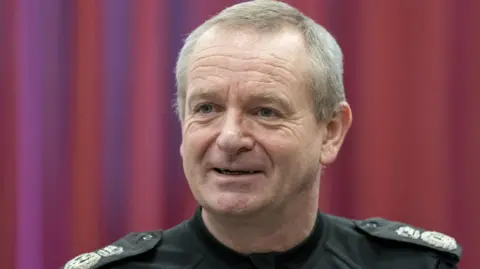Bayoh inquiry influenced ex-police chief's racism statement
 PA
PAA former chief constable of Police Scotland has said revelations at the public inquiry into the death of Sheku Bayoh played a major part in his decision to describe the force as institutionally racist.
Sir Iain Livingstone made the public declaration three months before he retired and after six years as the organisation's commanding officer.
Sheku Bayoh, 31, died after he was restrained on the ground following a violent confrontation with police in Kirkcaldy, Fife, in May 2015.
Sir Iain told the inquiry that statements made by Sheku Bayoh’s family and officers involved in the incident made him believe it was the right thing to do.
The inquiry is investigating the circumstances of the father-of-two's death, how police dealt with the aftermath, the subsequent investigation, and whether race was a factor.
Asked by inquiry counsel Angela Grahame KC about the timing of his comments, which were made at a Scottish Police Authority meeting last May, Sir Iain said he spoke out as it was the "right thing to do".
The former chief, who is now leading an independent probe into Troubles-era offences in Northern Ireland, added: "Ultimately the work of the inquiry had focused my mind and my thinking."
At the start of his evidence Sir Iain praised the "dignity and courage" Mr Bayoh's family had shown.
He added: "I will do everything I can to support the work of this inquiry."
Sir Iain later told the inquiry that the backlash he received for branding the force "institutionally racist" proved his assessment was correct.
He also admitted that a nine-year wait to find out if police officers would be subject to misconduct proceedings was "excessive".
And Sir Iain said that a report by an Independent Review Group (IRG), published in May 2023, led to him making the comment about institutional racism.
It echoed the language used in the Macpherson report, after the racist murder of Stephen Lawrence in south-east London in 1993.
The IRG report said: "There was a widespread view that while discriminatory attitudes were far from a thing of the past in Police Scotland, there had been a marked shift over the past decade.
"However our interviews with both key interviewees and divisional staff revealed instances of discrimination against minoritised communities, including first-hand accounts of racism, sexism and homophobia."
Sir Iain also he believed that acknowledging institutional racism was the first step to dealing with it.
The inquiry, taking place before Lord Bracadale in Edinburgh, continues.
